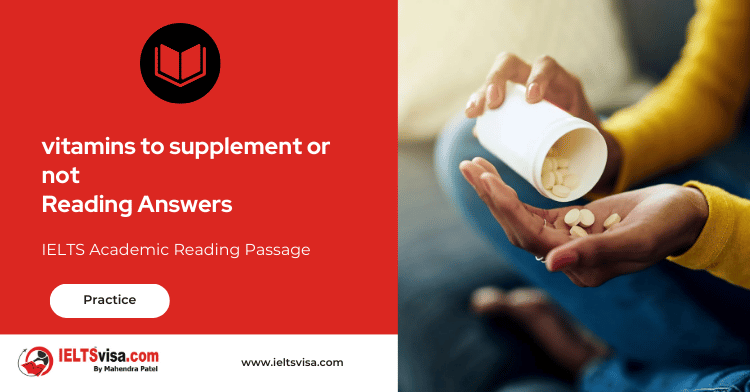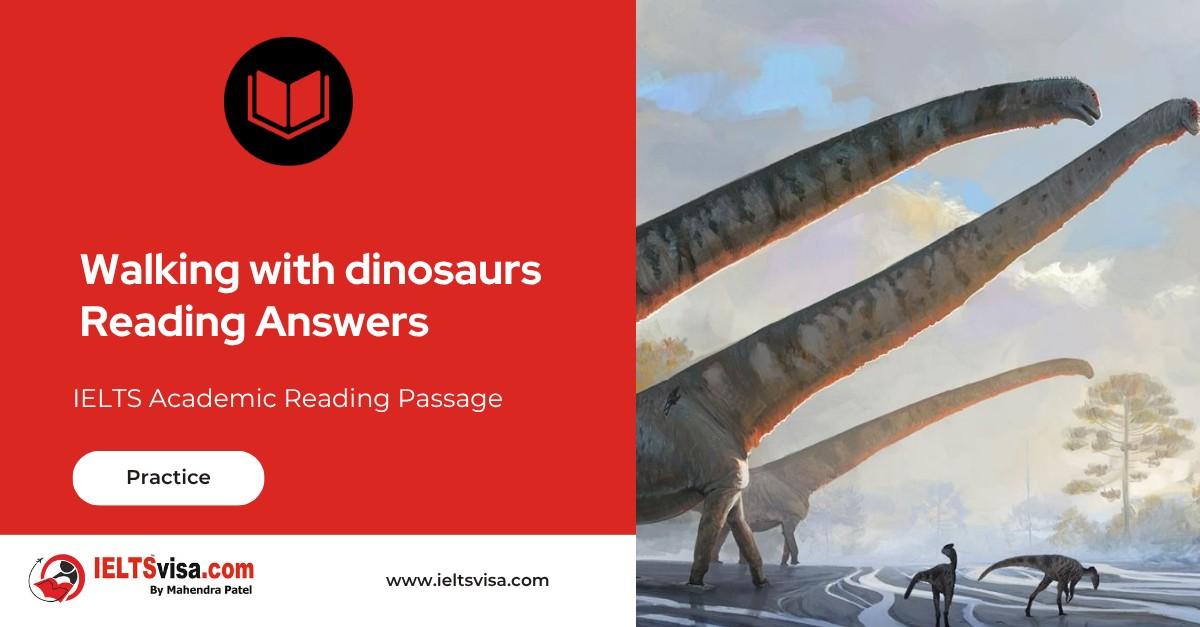Vitamins To supplement or not? Reading Answers
IELTS Academic Reading Passage
Mineral, vitamin, and antioxidant health supplements make up a multi-billion-dollar industry in the United States alone, but do they really work? Evidence suggests supplementation is clearly indicated in special circumstances, but can actually be harmful in others. For the general population, however, supplements have negligible or no impact on the prevention of common cancers, cardiovascular diseases, cognitive decline, mortality, or any other major indicators of health. In pursuit of a longer, happier and healthier life, there are certainly better investments for most people than a tube of vitamin supplements.
Particular sub-groups of the population can gain a proven benefit from supplementation. Folic acid has long been indicated as a prenatal supplement due to its assistance in foetal cell division and corresponding ability to prevent neural tube birth defects. Since Canada and the United States decided to require white flour to be fortified with folic acid, spinal birth defects have plummeted by 75%, and rates of neuroblastoma (a ravaging form of infant cancer) are now 50% lower. In countries without such fortification, or for women on low-carbohydrate diets, a prenatal multivitamin could make the crucial difference. The United States Department of Health and Human Services has concluded that the elderly may also benefit from extra vitamin D; calcium can help prevent bone fractures; and zinc and antioxidants can maintain vision while deflecting macular degeneration in people who would otherwise be likely to develop this affliction.
There is mounting evidence, however, for many people to steer clear of multivitamins. The National Institutes of Health has noted a “disturbing evidence of risk” in tobacco users: beta-carotene, a common ingredient in multivitamins, was found over a six-year study to significantly contribute to higher lung cancer and mortality rates in smokers. Meanwhile, excessive vitamin A (a supplement often taken to boost the immune system) has been proven to increase women’s risk of a hip fracture, and vitamin E, thought to improve cardiovascular health, was contraindicated in a study that demonstrated higher rates of congestive heart failure among such vitamin users. Antioxidant supplementation has no purpose nor does it achieve anything, according to the Food and Nutrition Board of the National Academy of Sciences, and the Medical Letter Group has gone further in suggesting they may interfere with treatment and promote some cancers. Antioxidants arc regarded as counteracting the destructive effect of free radicals in the body, but according to the Medical Letter’s theory, free radicals may also serve the purpose of sending a powerful signal to the body’s immune system to fix the damage. By taking supplements, we risk undermining that message and upsetting the balance of antioxidants and free radicals in the body. The supplements counteract the free radicals, the immune system is not placed on alert, and the disease could sneak through the gates.
One problem with supplementation by tablet is the poor record on digestibility. These tablets are often stocked with metal-based minerals that are essentially miniature rocks, and our bodies are unable to digest them. Even the vitamin elements of these pills that are theoretically digestible are often unable to be effectively extracted by our bodies when they arrive in such a condensed form. In Salt Lake City, for example, over 150 gallons of vitamin and mineral pills are retrieved from the sewer filters each month. According to the physician’s desk reference, only about 10% – 20% of multivitamins are absorbed by the body. The National Advisory Board is even more damning, suggesting that every 100mg of tablet corresponds to about 8.3mg of blood concentration, although noting that this can still potentially perform a helpful role in some cases. In effect, for every $100 you spend on vitamin supplements, over $90 of that is quite literally flushed down the toilet.
A final argument against multivitamins is the notion that they can lead people – consciously or not – to the conclusion that supplementation fills in the gaps of an unhealthy diet and mops up afterwards, leaving their bodies none the wiser that instead of preparing a breakfast of fresh fruit and muesli, they popped a tiny capsule with coffee and a chocolate bar. In a seven-year study, however, the Heart Protection study did not find any positive outcome whatsoever from multivitamins and concluded that while vitamins in the diet are important, multivitamin tablets are safe but completely useless. There is evidently no shortcut around the task of buying, preparing, and consuming fresh fruit and vegetables every day. Boosting, supplementing, and fortifying products alter people’s very perception of what healthy food is; instead of heading for the fresh produce aisle in the supermarket, they are likely to seek out sugary, processed foods with a handful of extra B vitamins as a healthy choice. We cannot supplement our way out of a bad diet.
Questions 14-16
Choose, the correct letter, A. B, C, or D.
Write the correct letters in blank spaces 14-16 on your answer sheet.
14 The writer does not recommend multivitamin supplementation for ……………………
A pregnant women.
B young children.
Canyone prone to eye problems.
D old people.
15 According to the writer, vitamin E has been shown to ………………….
A lead to heart problems.
B be good for heart health.
C support the immune system.
D have no effect.
16 The Medical letter Group believes antioxidant supplementation ……………………..
A is ineffective in attacking free radicals.
B alerts the immune system to the presence of free radicals.
C attacks both free radicals and the immune system.
D prevents the immune system from responding to free radicals.
Questions 17-21
Do the following statements agree with the information given in Reading Passage 2?
In boxes 17-21 on your answer sheet, write
YES, if the statement agrees with the views of the writer
NO, if the statement contradicts with the views of the writer
NOT GIVEN, if it is impossible to say what the writer thinks about this
17 Some multivitamin tablets have indigestible ingredients.
18 Some individual vitamins are better absorbed than others in a tablet form.
19 Our bodies cannot distinguish food-based from supplement-based vitamins.
20 Multivitamins can lead to poorer overall eating habits in a person’s life.
21 People typically know that fortified processed foods are not good for them.
Questions 22-26
Write the correct letter A, B or C, in boxes 22-26 on your answer sheet.
Classify the following groups of people according to whether they believe.
A the supplementation may have a positive effect
B the supplementation may have a negative effect
C supplementation has no effect
22 The United States Department of Health and Human Services
23 The National Institutes of Health
24 The Food and Nutrition Board of the National Academy of Sciences
25 The National Advisory Board
26 The Heart Protection Group

Solution For: Vitamins to supplement or not?
Reading Answers
| 14 – B | 21 – NO |
| 15 – A | 22 – A |
| 16 – D | 23 – B |
| 17 – YES | 24 – C |
| 18 – NOT GIVEN | 25 – A |
| 19 – NO | 26 – C |
| 20 – YES |
Review and Practice
- Regularly practice with IELTS reading samples and time yourself to get used to the pressure of the exam.
- Review your mistakes to understand where you went wrong and how to avoid similar errors in the future.
Our Books
Master IELTS Speaking Part 1
IELTS Writing Task 1 Book
IELTS Writing Task 2 Book
Vitamins To supplement or not? Reading Answers Explanation
Comin Soon
Practice IELTS Other Modules
IELTS Listening
The IELTS Listening test assesses how well you can understand spoken English in various contexts. It lasts about 30 minutes and is divided into four sections with a total of 40 questions. The listening tasks become increasingly difficult as the test progresses.
IELTS Academic Reading
The IELTS Academic Reading section assesses your ability to understand and interpret a variety of texts in academic settings. It is designed to evaluate a range of reading skills, including skimming for gist, reading for main ideas, reading for detail, understanding inferences, and recognizing a writer's opinions and arguments.
IELTS Speaking
The IELTS Speaking test assesses your ability to communicate in English on everyday topics. It lasts 11-14 minutes and consists of three parts: introduction, cue card, and a discussion based on the cue card topic.
IELTS General Reading
IELTS General Reading tests your ability to understand and interpret various types of texts. Here are some key areas and types of content you can expect to encounter in the reading section, along with tips for effective preparation.
IELTS Academic Writing Task 1
In IELTS Academic Writing Task 1, you are presented with a visual representation of information, such as graphs, charts, tables, or diagrams, and you are required to summarize, compare, or explain the data in your own words.
IELTS General Writing Task 1
In IELTS General Writing Task 1, you are required to write a letter based on a given situation. The letter can be formal, semi-formal, or informal, depending on the prompt. Here’s a breakdown of the key components to include in your letter
IELTS Academic Writing Task 2
In IELTS Academic Writing Task 2, you are required to write an essay in response to a question or topic. Here’s a guide to help you understand the essential elements of this task
IELTS Exam Tips
To succeed in the IELTS exam, practice regularly, familiarize yourself with the test format, improve your vocabulary, develop time management skills, and take mock tests to build confidence.
Grammer for IELTS
Grammar is the foundation of effective communication in English. Understanding tense usage, subject-verb agreement, and sentence structure enhances clarity and coherence in writing and speaking.
Vocabulary for IELTS
Vocabulary plays a crucial role in the IELTS (International English Language Testing System) exam, especially in the Speaking and Writing sections. Here’s an overview of why vocabulary is important and how it impacts your performance
RECENT IELTS SAMPLES QUESTIONS AND ANSWERS
Walking with dinosaurs
Peter L. Falkingham and his colleagues at Manchester University are developing techniques that...
Money as the Unit of Amount Reading Answers
The most difficult aspect of money to understand is its function as a unit of account. In...
WEATHERING IN THE DESERT
In the deserts, as elsewhere, rocks at the earth's surface are changed by weathering, which...
Nature on Display in American Zoos
The first zoo in the United States opened in Philadelphia in 1874, followed by the Cincinnati...
Can We Prevent the Poles From Melting
Such is our dependence on fossil fuels, and such is the volume of carbon dioxide we have...
Air conditioning the earth reading answers
The circulation of air in the atmosphere is activated by convection, the transference of heat...













